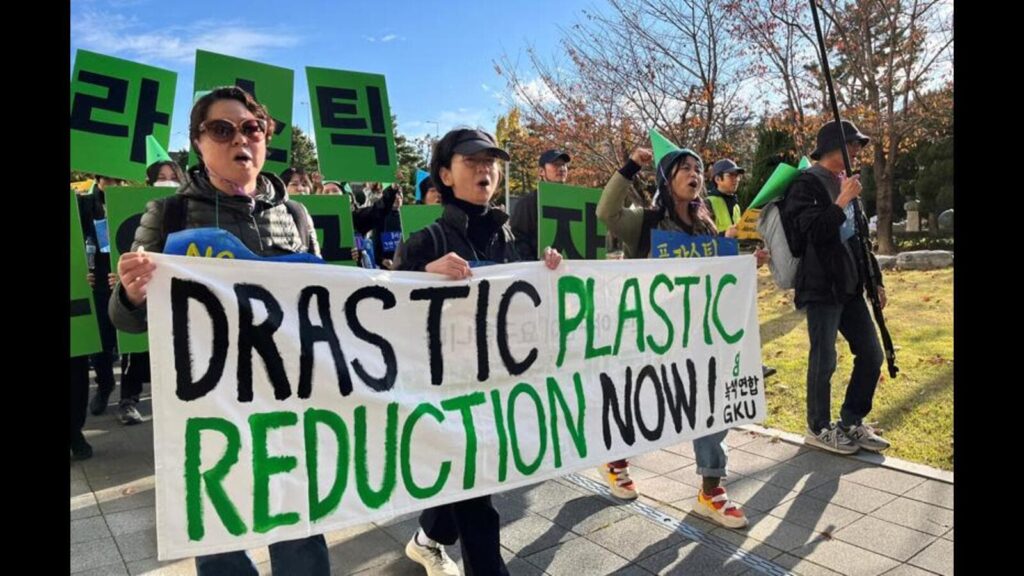New Delhi: Around 220 fossil fuel and chemical industry lobbyists have joined ongoing negotiations in Busan, South Korea, to develop a globally binding instrument to phase out plastic pollution. A new analysis shows that Industry representatives commented on “interference and obstruction.”

An analysis based on the United Nations Environment Program’s (UNEP) Tentative List of Intergovernmental Negotiating Committee (INC-5) participants shows that INC-5 has 220 members and the number of lobbyists registered to participate in negotiations. It turned out to be the most common. INC-4 identified 196 lobbyists.
According to the Center for International Environmental Law (CIEL), which conducted the analysis in collaboration with the International Pollutant Elimination Network (IPEN), more than 99% of plastics are made with chemicals derived from fossil fuels, and the fossil fuel and plastic industries are deeply connected. It is said that there is a connection. , the plastic-free movement, and the Global Alliance for Incinerator Alternatives (GAIA).
“Together, lobbyists for the fossil fuel and chemical industries will represent the largest single delegation at INC-5, significantly exceeding the 140 delegates from host South Korea. Union and It outnumbered the delegation of all its member states combined (191 delegates), outnumbered the Pacific Small Island Developing States (PSIDS) with 89 delegates by more than two to one, and outnumbered the entire Latin America and Caribbean region with 165 delegates. Exceeds. (GRULAC), respectively,” CIEL said.
Lobbyists for the chemical and fossil fuel industries also outnumber Scientists for an Effective Plastics Treaty by a 3-to-1 margin and outnumber the Indigenous Peoples Caucus by nearly 9-to-1.
“While we have seen an increasing number of fossil fuel and petrochemical industry lobbyists in each INC, the efforts to influence future treaties go far beyond the negotiations themselves.Industry Representatives Reports of intimidation and interference, including allegations that industry intimidated independent scientists participating in negotiations and that industry pressured national delegations to replace technical experts with pro-industry representatives. have come to the fore,” CIEL said.
“From the moment the gavel fell on UNEA-5.2 to the present, we have observed industry lobbyists surround negotiations with sadly familiar tactics of obstruction, distraction, intimidation, and misinformation. Delfin Levi Alvarez, Global Campaign Coordinator, United Nations Petrochemicals Campaign. CIEL said in a statement:
“Their strategy is taken directly from the strategy of climate change negotiations and seeks to protect the economic interests of countries and corporations that prioritize fossil fuel profits over human health, human rights, and the future of the planet.” The purpose is
The mission of this convention is very clear: to end plastic pollution. A growing body of evidence from independent scientists, frontline communities and indigenous peoples clearly shows that this cannot be achieved without reducing plastic production. The choice is clear: our lives or their profits,” she added.
The International Institute for Sustainable Development (IISD), which is tracking the negotiations, said observers have called for the freezing and phasing out of primary production to reduce plastic waste and the implementation of global extended producer responsibility (EPR) measures. He stressed the importance and need to ban the incineration of plastic waste. Among other things, recycling of toxic chemicals.
Before embarking on written negotiations, the Co-Chairs made it clear that this would be a paragraph-by-paragraph exercise. Some parties called for line-by-line negotiations, noting that many countries had already indicated their preference on this part.
The group has launched line-by-line negotiations on plastic waste management. Some delegations hoped that each party would take measures “based on common but distinct responsibilities.”
This qualification was opposed by many delegations, while others stressed that any proposed measures must take into account “national circumstances and capacities.”
According to IISD, money is the biggest prize for participants who met on the third day of the fifth session of INC-5 to develop a legally binding international instrument on plastic pollution, including in the marine environment (ILBI). It is said that it was a matter of interest.
Another big item that caught the attention of participants was technical. “Which products and chemicals may be regulated under the new treaty? How will design standards for plastic products be addressed? How will this treaty address issues of plastic production and supply? Is it?”
During the plenary session on the third day, there were many differences of opinion and debate over progress.
A Panamanian negotiator wrote to X: “The Panamanian delegation participating in the Plastics Treaty negotiations in Busan is deeply frustrated by the lack of progress after three days. Microplastics have even been detected in the bloodstream of newborn babies. The world must act. What more evidence do we need?”
Indian negotiator Naresh Pal Gangwar said the non-paper submitted by the INC5 chairman on the first day did not include articles on the “principles” and “scope” of a legally binding treaty.
“You know that the landing zone has been set and you have to live it to the letter.In the plenary session on the first day, it was said that this non-paper does not include an article on scope and principles. These will form the basis of a legally binding treaty.”
Fiji’s negotiators also said that “the lack of progress is disappointing and disastrous for countries on the front lines of the plastic pollution crisis,” adding that “the main focus of the text, rather than procedural semantics, is Let’s work on our mindset,” he added.



